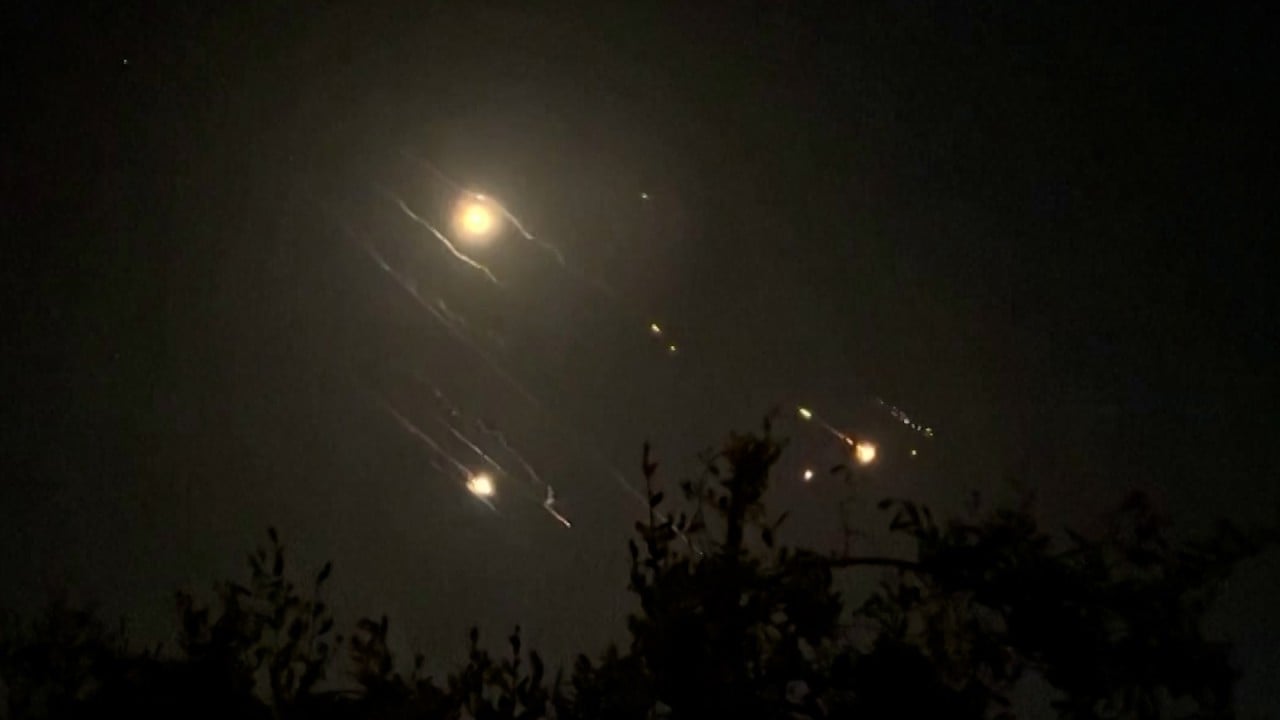“They have to decide, and they have to decide quickly. So, we’re looking to that, and I’m hopeful that they will make the right decision, and we can have a fundamental change in the dynamic,” Blinken said.
Hamas releases video of 2 Gaza hostages, as it ponders Israel ceasefire deal
Hamas releases video of 2 Gaza hostages, as it ponders Israel ceasefire deal
A Hamas delegation is due to arrive on Monday in Egypt, where it will respond to Israel’s latest proposal.
Egyptian Foreign Minister Sameh Shoukri said he is hopeful about the truce proposal.
“We are hopeful the proposal has taken into account the positions of both sides, has tried to extract moderation from both sides, and we are waiting to have a final decision,” Shoukry said on a panel at a World Economic Forum meeting in Riyadh.
“There are factors that will have impact on both sides … but I hope that all will rise to the occasion and recognise that we cannot have the situation of continuing loss of life.”
Although talks continue, Hamas has thus far balked at a series of offers negotiated by Egypt, Qatar and the United States and agreed to by Israel, and even without a deal, Blinken said it was critical to improve conditions in Gaza now.
“We’re also not waiting on a ceasefire to take the necessary steps to meet the needs of civilians in Gaza,” Blinken told Gulf Cooperation Council foreign ministers earlier Monday.
“We have seen measurable progress in the last few weeks, including the opening of new crossings and increased volume of aid delivery to Gaza and within Gaza, and the building of the US maritime corridor, which will open in the coming weeks. But it is not enough. We still need to get more aid in and around Gaza,” he said.
“We need to improve deconfliction with humanitarian assistance workers. And we have to find greater efficiency and greater safety, and deconfliction is at the heart of that. And, finally, we have to make sure that we’re focusing not just on inputs, but on impact.”
Scores of relief workers have been killed since the conflict began, and a deadly Israeli attack on a World Central Kitchen aid convoy in Gaza this month only highlighted the dangers and difficulties of protecting them. Israel has said the strike was a mistake and has disciplined officials involved.
World Central Kitchen says it would resume operations in Gaza on Monday after a four-week suspension.
The war has ground on since Hamas’ deadly October 7 attacks on Israel with little end in sight: more than 34,000 Palestinians have been killed, hundreds of thousands more are displaced and a humanitarian crisis in Gaza is worsening.
The conflict has fuelled mass protests around the world that have spread to American college campuses. US support for Israel, particularly arms transfers, has come under particular criticism, something the administration is keenly aware poses potential problems for US President Joe Biden in an election year.
Palestinian baby girl saved from dead mother’s womb dies amid Israel-Gaza war
Palestinian baby girl saved from dead mother’s womb dies amid Israel-Gaza war
Blinken’s trip comes amid renewed concerns about the conflict spreading in the Middle East and with once-promising prospects for Israeli-Saudi rapprochement effectively on hold as Israel refuses to consider one of the Saudis’ main conditions for normalised relations: the creation of a Palestinian state.
Meanwhile, the Biden administration has been warning Israel against a major military operation in the southern Gaza city of Rafah, where more than a million Palestinians have fled to escape fighting further north. Israel has not yet launched such an offensive, but Netanyahu has repeatedly said that one will take place, asserting that it is the only way to wipe out Hamas.
Both topics were discussed during the Biden-Netanyahu phone call on Sunday, according to the White House and US officials.
During his trip, Blinken said he would also underscore the absolute importance of not allowing the Israel-Gaza conflict to engulf the region.
The danger of conflagration was underscored this month when a suspected Israeli attack on an Iranian consular building in Syria prompted an unprecedented direct missile and drone response by Iran against Israel. An apparent retaliatory Israeli strike on Iran followed.
Although the tit-for-tat cycle appears to have ended for now, deep concerns remain that Iran or its proxies in Iraq, Lebanon, Syria or Yemen could act in such a way as to provoke a greater response from Israel or that Israel might take action that Iran feels it must retaliate for.
Additional reporting by Reuters


